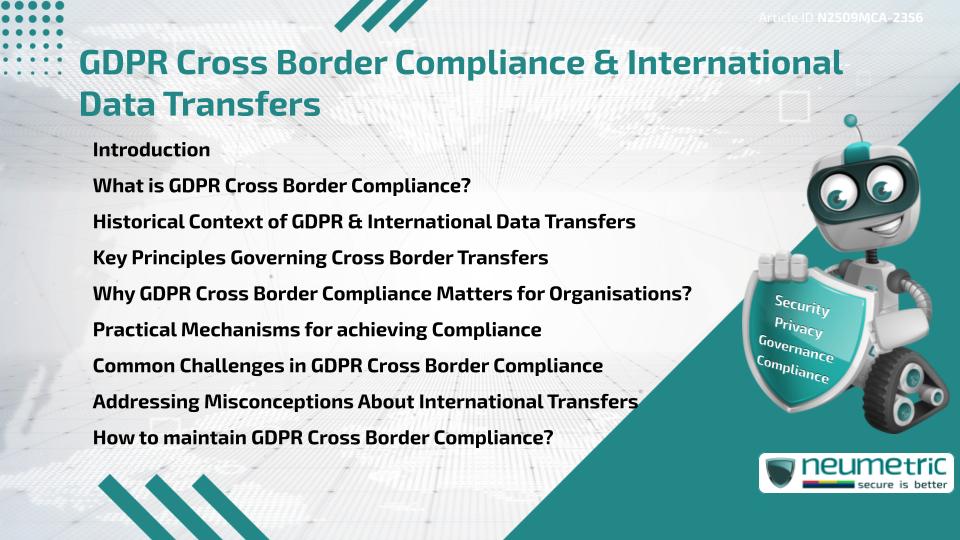Table of Contents
ToggleIntroduction
GDPR Cross Border Compliance is a cornerstone of Data Protection in today’s interconnected digital economy. The General Data Protection Regulation [GDPR] restricts how Personal Data moves outside the European Economic Area [EEA], requiring strict safeguards to protect individuals’ rights. Achieving GDPR Cross Border Compliance means Organisations must adopt lawful transfer mechanisms, demonstrate Accountability & safeguard Privacy across borders. Without it, businesses Risk penalties, Reputational damage & loss of Customer Trust.
What is GDPR Cross Border Compliance?
GDPR Cross Border Compliance refers to the adherence to GDPR rules when transferring Personal Data internationally. The Regulation sets conditions to ensure data leaving the EEA receives the same level of protection abroad as it does within Europe. This includes identifying lawful transfer mechanisms, such as adequacy decisions, standard contractual clauses or binding corporate rules. Compliance ensures that Data Subjects’ rights are respected regardless of where the data is processed.
Historical Context of GDPR & International Data Transfers
Before the GDPR came into effect in 2018, data transfers relied on the Data Protection Directive. However, the Directive lacked uniform enforcement & consistent safeguards. Landmark cases like the Schrems I & Schrems II judgments challenged the validity of data transfer frameworks such as Safe Harbor & Privacy Shield, highlighting weaknesses in transatlantic data flows. GDPR strengthened the rules by introducing stricter Accountability measures & by giving Regulators the authority to enforce Compliance globally.
Key Principles Governing Cross Border Transfers
GDPR cross border Data Transfers must adhere to key principles:
- Lawfulness, Fairness & Transparency
- Purpose limitation
- Data Minimisation
- Integrity & Confidentiality
- Accountability
These principles ensure that Personal Data is handled consistently & responsibly, even when transferred beyond the EEA. Organisations cannot simply rely on contractual arrangements; they must also conduct Risk Assessments & implement Technical & Organisational safeguards.
Why GDPR Cross Border Compliance Matters for Organisations?
Compliance matters for several reasons:
- Protects individuals’ Privacy Rights
- Builds trust with Customers & Partners
- Reduces the Risk of Regulatory Fines & Investigations
- Supports international Business Operations by enabling lawful data flows
For instance, an e-commerce company that shares Customer Data with service providers outside the EEA must prove that adequate safeguards are in place. Without Compliance, the business Risks both legal Penalties & Reputational harm.
Practical Mechanisms for achieving Compliance
Organisations have several tools to achieve GDPR Cross Border Compliance:
- Adequacy decisions granted by the European Commission
- Standard contractual clauses approved by Regulators
- Binding corporate rules for multinational Organisations
- Codes of conduct & Certification mechanisms
Each mechanism requires careful Documentation, Implementation & ongoing Monitoring to ensure Compliance. Organisations must also conduct Transfer Impact Assessments [TIAs] to evaluate the Risks associated with data flows.
Common Challenges in GDPR Cross Border Compliance
Businesses often face difficulties such as:
- Complex Regulatory requirements that vary by jurisdiction
- High costs of implementing Contractual & Technical safeguards
- Uncertainty caused by evolving Case Law & Regulatory guidance
A common misconception is that signing Standard contractual clauses is enough. In reality, Organisations must supplement these clauses with robust Security Measures, such as Encryption & Access Controls.
Addressing Misconceptions About International Transfers
Misconceptions include believing that GDPR prohibits all international transfers or that once a contract is signed, Compliance is guaranteed. In truth, GDPR allows international transfers but only under specific conditions. Compliance is an ongoing process, requiring regular Reviews of Legal, Technical & Organisational safeguards.
How to maintain GDPR Cross Border Compliance?
Maintaining Compliance involves continuous effort:
- Conducting regular Transfer Impact Assessments
- Monitoring changes in adequacy decisions & Regulatory guidance
- Updating contractual Clauses & Policies
- Training staff on GDPR obligations & international data transfer rules
Like maintaining strong Cybersecurity, Compliance is not a one-off exercise but a sustained practice of vigilance & adaptation.
Takeaways
- GDPR Cross Border Compliance protects Personal Data when transferred internationally
- It ensures Organisations adopt lawful mechanisms & robust safeguards
- Compliance builds Trust, reduces Risks & supports global Business Operations
- Ongoing Monitoring & Accountability are essential for sustained Compliance
FAQ
What is the main goal of GDPR Cross Border Compliance?
It ensures Personal Data leaving the EEA continues to receive the same level of protection as within Europe.
What mechanisms allow international transfers under GDPR?
Mechanisms include adequacy decisions, standard contractual clauses, binding corporate rules & Certification mechanisms.
Do Standard contractual clauses alone guarantee Compliance?
No, they must be supported with Risk Assessments & additional Technical safeguards.
How often should Transfer Impact Assessments be conducted?
They should be conducted before any new transfer arrangement & reviewed periodically based on Risks or Regulatory updates.
Can Small Businesses comply with GDPR Cross Border Compliance?
Yes, GDPR applies to Organisations of all sizes. Compliance Requirements scale depending on data processing activities.
What are the Risks of non-Compliance?
Non-Compliance can lead to Financial penalties, reputational damage, loss of Customer Trust & restrictions on international data flows.
Is GDPR Cross Border Compliance only about legal contracts?
No, it also requires technical measures, organisational Policies & Continuous Monitoring to ensure Data Protection.
Need help for Security, Privacy, Governance & VAPT?
Neumetric provides organisations the necessary help to achieve their Cybersecurity, Compliance, Governance, Privacy, Certifications & Pentesting needs.
Organisations & Businesses, specifically those which provide SaaS & AI Solutions in the Fintech, BFSI & other regulated sectors, usually need a Cybersecurity Partner for meeting & maintaining the ongoing Security & Privacy needs & requirements of their Enterprise Clients & Privacy conscious Customers.
SOC 2, ISO 27001, ISO 42001, NIST, HIPAA, HECVAT, EU GDPR are some of the Frameworks that are served by Fusion – a SaaS, multimodular, multitenant, centralised, automated, Cybersecurity & Compliance Management system.
Neumetric also provides Expert Services for technical security which covers VAPT for Web Applications, APIs, iOS & Android Mobile Apps, Security Testing for AWS & other Cloud Environments & Cloud Infrastructure & other similar scopes.
Reach out to us by Email or filling out the Contact Form…


